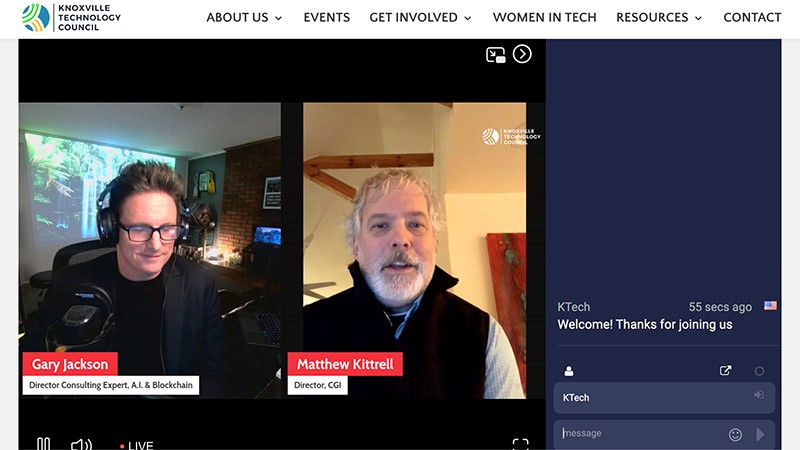
CGI explains the future of Web3 and AI
The educational session was intended to be held at the new CGI offices in downtown Knoxville but was held virtually due to inclement weather.
Global technology company, CGI is working on some fascinating innovations in the realm of artificial intelligence (AI). On Thursday, Director Matthew Kittrell, who also serves on the board of the Knoxville Technology Council (KTECH), hosted a session to explain the future of AI and its effects on many industries.
Gary Jackson led the conversation. He is the Director of AI & Distributed Ledger Technologies at CGI and specializes in AI and Blockchain. He has had a 25-year career in data science and big data engineering and uses those skills when exploring how AI can be applied in various spheres.
The event was intended to be held at the new CGI offices in downtown Knoxville, which opened in August 2023. However, due to inclement weather, the session was held virtually.
Jackson shared a bit of background about the explosion of AI in the last few years. Platforms like ChatGPT, image-generating apps, and prompt engineering have taken the public by storm. With the innovation also comes a lot of questions about the moral ethics and legality of AI.
Simply put, training information is provided (input), it goes through an assigned algorithm, and it pumps out the product (output).
“Even if AI is learning and progressing, it always comes back to the humans who are driving these scenarios,” Jackson said.
There’s been legal ramifications for the information that is fed into the AI software. For example, the New York Times sued Open AI for feeding the algorithm copywritten information, interviews, and reporting from the newspaper.
Jackson said that AI cannot operate without training information, and situations like this create blurred ethical lines around AI. Furthermore, it demonstrates how much potential there is for change in the world as we know it.
Other companies, like Cannon, Nikon, and Sony have said they are working to put digital signatures on photos that were taken with their cameras. The goal of developing this technology is to help people understand the difference between an artistic picture taken by a photographer and a deep fake, or AI-generated artwork.
However, one of the initiatives largely driven by AI that shows promise of potential is Web 3.0. This would be the third generation of the World Wide Web.
Here’s how Jackson broke it down: Web 1.0 started in the early 1990s with the chunky computers. This period was characterized by HTML, static web pages, and email. Web 2.0 represents the World Wide Web as we know it today. It is characterized by connectivity via social media, interactive websites, content creation, and the online economy (selling goods and services).
Web 3.0 takes it to an unprecedented level. It will completely disrupt the World Wide Web as we know it. According to Jackson, three things characterize Web 3.0: user-centric, decentralized, and secure.
“Web 3.0 is how we take our data back,” Jackson said. “The concept is gaining traction and it’s not going away.”
This pending shift will prioritize web-user privacy, by denying the right for major companies to access data from its users. Jackson also predicts a wave of tokenization will characterize Web 3.0, meaning currencies will be largely digitized, identities will be digitized, and even some real-world assets will be digitized, too. We will also likely see a rise in Decentralized Autonomous Organizations (DAOs) using blockchain technology.
“The goal is to create a digital identity that cannot be erased. It is truly who you are. And confirms that you are who you say you are,” Jackson said.
However, the shift toward Web 3.0 wouldn’t likely be possible without the utilization of Extended AI (XAI), which was created to keep humans in the loop with how the technology progresses. It would also ensure that all the jobs assigned to artificial intelligence systems have human oversight.
Jackson suggested Web 3.0 would also require widespread acceptance of Extended AI and Blockchain-tethered AI. These technologies would ensure transparency and prevent inaccuracies. Therefore, no inaccurate training data gets put into the AI algorithms and no incorrect data comes out. Essentially, it creates guardrails.
There’s a lot in the pipeline when it comes to artificial intelligence technology. CGI is at the forefront of those conversations and researching potential, applicable technologies. Thank you to Gary Jackson and CGI for the informative and intriguing session about AI of the future.
If you missed the session, you can watch the replay here.
Like what you've read?
Forward to a friend!

